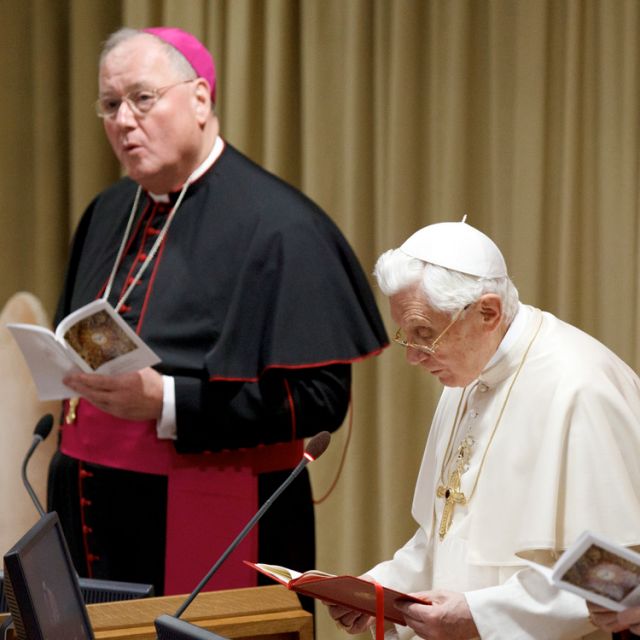Cardinal-designate Dolan leads cardinals' reflection on evangelization
VATICAN CITY - Secularism has had an easy time spreading through many traditionally Christian cultures because so many Christians do not know their faith and do not grasp the truth it teaches, Cardinal-designate Timothy M. Dolan of New York told the College of Cardinals.
While the New York prelate did not downplay the challenges the church faces in reviving the faith of its members and bringing the Gospel to those who have never heard it, he delivered his assessment Feb. 17 with his characteristic smile and broad gestures, telling Pope Benedict XVI and the cardinals that evangelization requires joy and love.
Pope says no future without children, urges support for large families
VATICAN CITY - Pope Benedict XVI called on governments and communities to help large families, saying children represent hope and the well-being of every nation.
"There is no future without children," he said at the end of his general audience Feb. 15 in a greeting to members of an Italian association of large families.
"In today's social context, a family made up of many children constitutes a witness of faith, courage and optimism," he said.
We can be instruments of God’s reign
First Sunday of Lent (Year B) Feb. 26 (Genesis 9:8-15; Psalm 25; 1 Peter 3:18-22; Mark 1:12-15)
What is the connection between a beautiful rainbow and the aftermath of a catastrophic flood? To our own minds, there is no connection at all. The flood is the result of natural forces — rain, wind and tides — and there is little or no meaning in it. A rainbow, as beautiful as it is, is caused by the sun being refracted through the moisture in the air. But if you are a person living in the ancient world, every manifestation of nature is the hand of God. Ancient people “connected dots” — event “B” occurred after event “A,” therefore “A” must have been the cause, with God as the ultimate connection between all events.
Other sheep not of our flock
I grew up with strong, conservative, Roman Catholic roots: the Baltimore Catechism, the Latin Mass, daily rosary, daily Mass if possible and a rich stream of devotional practices. And that’s a gift for which I’m deeply grateful.
But that wonderful grounding also brought with it a distrust of all religious things not Roman Catholic. I was taught that the Roman Catholic Church was the only true Church and the only road to heaven; so much so that we were strongly discouraged and tacitly forbidden to participate in any Protestant services. In fairness to that catechesis, we didn’t believe Protestants and other religious communities were doomed to eternal perdition, but we struggled mightily to articulate how this might take place. Among other things, we postulated a place we called Limbo, where sincere, non-Roman Catholics with good souls might spend eternity, happy but without God.
Pope: Vocations are born from openness to the love of God
VATICAN CITY - Love of God nurtures love of neighbor, especially in people with vocations to the priesthood or religious life, said Pope Benedict XVI in his message for the World Day of Prayer for Vocations.
The papal message for the 49th World Day of Prayer for Vocations, which will be observed April 29, was released Feb. 13 at the Vatican.
We need to re-sensitize ourselves to God’s compassion and mercy
Seventh Sunday in Ordinary Time (Year B) Feb. 19 (Isaiah 43:18-19, 20-22, 24-25; Psalm 41; 2 Corinthians 1:18-22; Mark 2:1-12)
Humanity has a huge memory problem. On the one hand, we are far too quick to forget things that should be the source of wisdom. It is very easy to sweep unpleasant or painful actions and events under the mental carpet and refuse to learn from our mistakes. On the other hand, often the problem is just the opposite: an overactive memory and a refusal to let go of the past. People (or groups) can cling to traumas and injustices and continually relive them. They can engage in a lot of inner self-flagellation and self-hatred.
Lent is time to help others spiritually, materially, pope says
VATICAN CITY - In his Lenten message, Pope Benedict XVI called on the faithful to be concerned for one another and "not to remain isolated and indifferent" to the fate others.
Materialism and a sense of self-sufficiency are obstacles to a Christian life of charity, the Pope said.
Instead of looking first to God and then to the well-being of others, people often have an attitude of "indifference and disinterest born of selfishness and masked as a respect for 'privacy.'"
Richer orders should share with poorer religious, says Vatican prefect
VATICAN CITY - Wealthier religious orders should share their resources with struggling religious communities, said the prefect of the Congregation for Institutes of Consecrated Life and Societies of Apostolic Life.
Cardinal-designate Joao Braz de Aviz said that while religious men and women live a life of poverty and possess nothing, their religious "institution doesn't always give the same witness."
"It's not that we are against holding assets or are saying the church cannot have all the things it needs," he said in an interview with the Vatican newspaper, L'Osservatore Romano, Feb. 2.
Strong bond with God is defining quality of religious life, pope says
VATICAN CITY - Strengthening one's relationship with God must be the highest priority and most defining quality of religious life, Pope Benedict XVI said.
Celebrating vespers with members of religious orders Feb. 2, the feast of the Presentation of the Lord and the World Day for Consecrated Life, the Pope said the day was a way of bringing greater attention to the witness of faith of religious men and women worldwide.
In his homily during the evening service in St. Peter's Basilica, Pope Benedict said the day was also an important occasion for religious to "renew your intentions and rekindle the feelings that inspire the giving of yourselves to God."
From Valentine’s to ashes
Anne was a pretty young blonde. She always had men interested in her, had friends, intelligence and a good career, and was a generous, good-hearted person. How surprising to hear, later on, she’d found her good looks a point of difficulty.
She’d learned that often people were interested in her body but not the rest of her; underneath her popularity she had trouble finding self-worth. So though she took good care of her body, she was not on good terms with it.
Jesus reaches out with compassion
Sixth Sunday in Ordinary Time (Year B) Feb. 12 (Leviticus 13:1-2, 45-46; Psalm 32; 1 Corinthians 10:31-11:1; Mark 1:40-45)
Fear is a constant human companion. People fear many things — irrationally for the most part — but especially those things that are different in ways that are deemed to be threatening.











